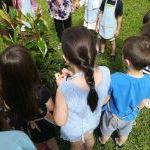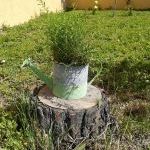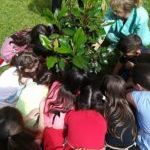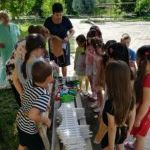Suskinder
The project provides an e-learning course and website to support sustainable food in kindergartens. The web portal offers online educational resources on sustainable food in early years settings for educators, support assistants, caterers and kitchen staff. It covers issues including the role of staff, sustainable meals, taste and outdoor learning.
Website
Country
Media
Useful links:
Food for Life in the UK provides a whole-school approach for nurseries and early years settings that wish to develop health meals and good food education. You can sign up to their awards programme to monitor and celebrate progress!
* TOP TIP *
'Research what sustainability means. What is sustainable food and what are the benefits?'
How is the project linked to climate change and sustainability?
The online course links issues about food, culture, health, and the environment, enriching school environment, linking children learning and well-being. It enhances their understanding about the natural world, sustainability and the impact of climate change.
Who is involved?
The project worked with early years settings teachers, kitchen staff, and caterers. Other important target groups include early years managers, public administration decision makers and those further and higher education establishments that offer training to individuals wishing to develop their careers in the early years sector. This example at Prolet Kindergarten shows how the project combined practical activities with the children together with training for the kindergarten staff.
How are the participants involved?
Outdoor learning and practical training in planting of herbs and flowers was held at Prolet Kindergarten. Children created a colourful playground by planting roses, carnations and gerberas. As well as being a lot of fun, child-led gardening presented great opportunities to learn about the environment, healthy eating and life cycles. Children were introduced to the magical world of herbs. Together they planted summer savoury, basil, celery , mint and summer savoury (one of the most traditional Bulgarian spices). It is an annual plant with a specific herbal taste. Its leaves, whether dried or fresh, is an integral part of the preparation of many favorite dishes as lentils, green beans, peas, beans, potatoes and stews.
A training workshop was held with teachers, kitchen and administrative staff from the kindergarten. Participants in the seminar discussed different areas for action when it comes to food. The general opinion was that interdependencies between healthy children, catering, environment and climate are essential for strong local food systems. By raising children 's knowledge about the environmental impact of food produce and involve them in the food process, from product to plate, we help them to understand what and how we eat and the impact it has on our personal health and the environment.
Key steps:
The e-learning course consists of the following five modules and you may wish to explore these topics further with your own kindergarten:
1: Develop the role of kindergarten staff to change food habits
- Build a “nutrition team” in your kindergarten
- Reflect on existing eating habits, the rules and regulations with the kindergarten staff
- Set common objectives for food standards in your meals
- Create an action plan and conductive framework conditions
2: Raise quality and make food more sustainable
- Comply with national dietary recommendations (nutritional value, variety, suitable for children)
- Consider special nutritional requirements in your plans (intolerances, allergies, religious restrictions)
- Aim to use more fresh products in the kindergarten
- Develop a step-by-step plan towards a more sustainable catering based on manageable priorities
3: Explore outdoor learning as a good engagement opportunity
- Involve parents in your plans and communicate how their children will benefit from outdoor play and learning. Seek out and use the expertise and skills of parents.
- Establish some basic ground rules with the children and ensure they have clothing appropriate to the weather conditions.
- Select the correct-sized gardening tools for the child. Avoid the use of sharp and / or mechanical items.
- Provide hand-washing facilities, through the use of the use of liquid soap, warm water, and paper towels. T
4: Food taste and intercultural eating skills
- Review how to introduce new foods and tastes to children in an enjoyable way
- Provide a nice and encouraging eating atmosphere for a child
- Write a plan how to include food into different seasonal festivals and other celebrations.
- Explore how to use food as an opportunity to integrate different cultural and ethnic groups.
5: How to communicate with and inspire parents
- Parental involvent is important - make sure you overcome any bariers and start communicating
- Welcome diversity and try to make most of it through food
- Involve parents and community members in the school life around good food
- Try to integrate immigrant familes in the daily life of the school




